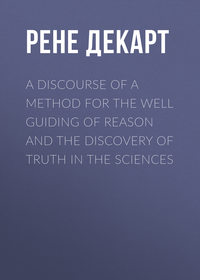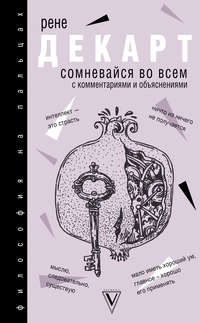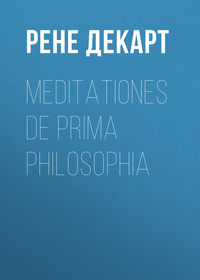 полная версия
полная версияSelections from the Principles of Philosophy

René Descartes
Selections from the Principles of Philosophy
LETTER OF THE AUTHOR
TO THE FRENCH TRANSLATOR OF THE PRINCIPLES OF PHILOSOPHY SERVING FOR A PREFACE
Sir,—The version of my principles which you have been at pains to make, is so elegant and finished as to lead me to expect that the work will be more generally read in French than in Latin, and better understood. The only apprehension I entertain is lest the title should deter some who have not been brought up to letters, or with whom philosophy is in bad repute, because the kind they were taught has proved unsatisfactory; and this makes me think that it will be useful to add a preface to it for the purpose of showing what the MATTER of the work is, what END I had in view in writing it, and what UTILITY may be derived from it. But although it might be my part to write a preface of this nature, seeing I ought to know those particulars better than any other person, I cannot nevertheless prevail upon myself to do anything more than merely to give a summary of the chief points that fall, as I think, to be discussed in it: and I leave it to your discretion to present to the public such part of them as you shall judge proper.
I should have desired, in the first place, to explain in it what philosophy is, by commencing with the most common matters, as, for example, that the word PHILOSOPHY signifies the study of wisdom, and that by wisdom is to be understood not merely prudence in the management of affairs, but a perfect knowledge of all that man can know, as well for the conduct of his life as for the preservation of his health and the discovery of all the arts, and that knowledge to subserve these ends must necessarily be deduced from first causes; so that in order to study the acquisition of it (which is properly called philosophizing), we must commence with the investigation of those first causes which are called PRINCIPLES. Now these principles must possess TWO CONDITIONS: in the first place, they must be so clear and evident that the human mind, when it attentively considers them, cannot doubt of their truth; in the second place, the knowledge of other things must be so dependent on them as that though the principles themselves may indeed be known apart from what depends on them, the latter cannot nevertheless be known apart from the former. It will accordingly be necessary thereafter to endeavour so to deduce from those principles the knowledge of the things that depend on them, as that there may be nothing in the whole series of deductions which is not perfectly manifest. God is in truth the only being who is absolutely wise, that is, who possesses a perfect knowledge of all things; but we may say that men are more or less wise as their knowledge of the most important truths is greater or less. And I am confident that there is nothing, in what I have now said, in which all the learned do not concur.
I should, in the next place, have proposed to consider the utility of philosophy, and at the same time have shown that, since it embraces all that the human mind can know, we ought to believe that it is by it we are distinguished from savages and barbarians, and that the civilisation and culture of a nation is regulated by the degree in which true philosophy nourishes in it, and, accordingly, that to contain true philosophers is the highest privilege a state can enjoy. Besides this, I should have shown that, as regards individuals, it is not only useful for each man to have intercourse with those who apply themselves to this study, but that it is incomparably better he should himself direct his attention to it; just as it is doubtless to be preferred that a man should make use of his own eyes to direct his steps, and enjoy by means of the same the beauties of colour and light, than that he should blindly follow the guidance of another; though the latter course is certainly better than to have the eyes closed with no guide except one's self. But to live without philosophizing is in truth the same as keeping the eyes closed without attempting to open them; and the pleasure of seeing all that sight discloses is not to be compared with the satisfaction afforded by the discoveries of philosophy. And, finally, this study is more imperatively requisite for the regulation of our manners, and for conducting us through life, than is the use of our eyes for directing our steps. The brutes, which have only their bodies to conserve, are continually occupied in seeking sources of nourishment; but men, of whom the chief part is the mind, ought to make the search after wisdom their principal care, for wisdom is the true nourishment of the mind; and I feel assured, moreover, that there are very many who would not fail in the search, if they would but hope for success in it, and knew the degree of their capabilities for it. There is no mind, how ignoble soever it be, which remains so firmly bound up in the objects of the senses, as not sometime or other to turn itself away from them in the aspiration after some higher good, although not knowing frequently wherein that good consists. The greatest favourites of fortune—those who have health, honours, and riches in abundance— are not more exempt from aspirations of this nature than others; nay, I am persuaded that these are the persons who sigh the most deeply after another good greater and more perfect still than any they already possess. But the supreme good, considered by natural reason without the light of faith, is nothing more than the knowledge of truth through its first causes, in other words, the wisdom of which philosophy is the study. And, as all these particulars are indisputably true, all that is required to gain assent to their truth is that they be well stated.
But as one is restrained from assenting to these doctrines by experience, which shows that they who make pretensions to philosophy are often less wise and reasonable than others who never applied themselves to the study, I should have here shortly explained wherein consists all the science we now possess, and what are the degrees of wisdom at which we have arrived. The first degree contains only notions so clear of themselves that they can be acquired without meditation; the second comprehends all that the experience of the senses dictates; the third, that which the conversation of other men teaches us; to which may be added as the fourth, the reading, not of all books, but especially of such as have been written by persons capable of conveying proper instruction, for it is a species of conversation we hold with their authors. And it seems to me that all the wisdom we in ordinary possess is acquired only in these four ways; for I do not class divine revelation among them, because it does not conduct us by degrees, but elevates us at once to an infallible faith.
There have been, indeed, in all ages great minds who endeavoured to find a fifth road to wisdom, incomparably more sure and elevated than the other four. The path they essayed was the search of first causes and true principles, from which might be deduced the reasons of all that can be known by man; and it is to them the appellation of philosophers has been more especially accorded. I am not aware that there is any one of them up to the present who has succeeded in this enterprise. The first and chief whose writings we possess are Plato and Aristotle, between whom there was no difference, except that the former, following in the footsteps of his master, Socrates, ingenuously confessed that he had never yet been able to find anything certain, and that he was contented to write what seemed to him probable, imagining, for this end, certain principles by which he endeavoured to account for the other things. Aristotle, on the other hand, characterised by less candour, although for twenty years the disciple of Plato, and with no principles beyond those of his master, completely reversed his mode of putting them, and proposed as true and certain what it is probable he himself never esteemed as such. But these two men had acquired much judgment and wisdom by the four preceding means, qualities which raised their authority very high, so much so that those who succeeded them were willing rather to acquiesce in their opinions, than to seek better for themselves. The chief question among their disciples, however, was as to whether we ought to doubt of all things or hold some as certain,—a dispute which led them on both sides into extravagant errors; for a part of those who were for doubt, extended it even to the actions of life, to the neglect of the most ordinary rules required for its conduct; those, on the other hand, who maintained the doctrine of certainty, supposing that it must depend upon the senses, trusted entirely to them. To such an extent was this carried by Epicurus, that it is said he ventured to affirm, contrary to all the reasonings of the astronomers, that the sun is no larger than it appears.
It is a fault we may remark in most disputes, that, as truth is the mean between the two opinions that are upheld, each disputant departs from it in proportion to the degree in which he possesses the spirit of contradiction. But the error of those who leant too much to the side of doubt, was not followed for any length of time, and that of the opposite party has been to some extent corrected by the doctrine that the senses are deceitful in many instances. Nevertheless, I do not know that this error was wholly removed by showing that certitude is not in the senses, but in the understanding alone when it has clear perceptions; and that while we only possess the knowledge which is acquired in the first four grades of wisdom, we ought not to doubt of the things that appear to be true in what regards the conduct of life, nor esteem them as so certain that we cannot change our opinions regarding them, even though constrained by the evidence of reason.
From ignorance of this truth, or, if there was any one to whom it was known, from neglect of it, the majority of those who in these later ages aspired to be philosophers, blindly followed Aristotle, so that they frequently corrupted the sense of his writings, and attributed to him various opinions which he would not recognise as his own were he now to return to the world; and those who did not follow him, among whom are to be found many of the greatest minds, did yet not escape being imbued with his opinions in their youth, as these form the staple of instruction in the schools; and thus their minds were so preoccupied that they could not rise to the knowledge of true principles. And though I hold all the philosophers in esteem, and am unwilling to incur odium by my censure, I can adduce a proof of my assertion, which I do not think any of them will gainsay, which is, that they all laid down as a principle what they did not perfectly know. For example, I know none of them who did not suppose that there was gravity in terrestrial bodies; but although experience shows us very clearly that bodies we call heavy descend towards the center of the earth, we do not, therefore, know the nature of gravity, that is, the cause or principle in virtue of which bodies descend, and we must derive our knowledge of it from some other source. The same may be said of a vacuum and atoms, of heat and cold, of dryness and humidity, and of salt, sulphur, and mercury, and the other things of this sort which some have adopted as their principles. But no conclusion deduced from a principle which is not clear can be evident, even although the deduction be formally valid; and hence it follows that no reasonings based on such principles could lead them to the certain knowledge of any one thing, nor consequently advance them one step in the search after wisdom. And if they did discover any truth, this was due to one or other of the four means above mentioned. Notwithstanding this, I am in no degree desirous to lessen the honour which each of them can justly claim; I am only constrained to say, for the consolation of those who have not given their attention to study, that just as in travelling, when we turn our back upon the place to which we were going, we recede the farther from it in proportion as we proceed in the new direction for a greater length of time and with greater speed, so that, though we may be afterwards brought back to the right way, we cannot nevertheless arrive at the destined place as soon as if we had not moved backwards at all; so in philosophy, when we make use of false principles, we depart the farther from the knowledge of truth and wisdom exactly in proportion to the care with which we cultivate them, and apply ourselves to the deduction of diverse consequences from them, thinking that we are philosophizing well, while we are only departing the farther from the truth; from which it must be inferred that they who have learned the least of all that has been hitherto distinguished by the name of philosophy are the most fitted for the apprehension of truth.
After making those matters clear, I should, in the next place, have desired to set forth the grounds for holding that the true principles by which we may reach that highest degree of wisdom wherein consists the sovereign good of human life, are those I have proposed in this work; and two considerations alone are sufficient to establish this—the first of which is, that these principles are very clear, and the second, that we can deduce all other truths from them; for it is only these two conditions that are required in true principles. But I easily prove that they are very clear; firstly, by a reference to the manner in which I found them, namely, by rejecting all propositions that were in the least doubtful, for it is certain that such as could not be rejected by this test when they were attentively considered, are the most evident and clear which the human mind can know. Thus by considering that he who strives to doubt of all is unable nevertheless to doubt that he is while he doubts, and that what reasons thus, in not being able to doubt of itself and doubting nevertheless of everything else, is not that which we call our body, but what we name our mind or thought, I have taken the existence of this thought for the first principle, from which I very clearly deduced the following truths, namely, that there is a God who is the author of all that is in the world, and who, being the source of all truth, cannot have created our understanding of such a nature as to be deceived in the judgments it forms of the things of which it possesses a very clear and distinct perception. Those are all the principles of which I avail myself touching immaterial or metaphysical objects, from which I most clearly deduce these other principles of physical or corporeal things, namely, that there are bodies extended in length, breadth, and depth, which are of diverse figures and are moved in a variety of ways. Such are in sum the principles from which I deduce all other truths. The second circumstance that proves the clearness of these principles is, that they have been known in all ages, and even received as true and indubitable by all men, with the exception only of the existence of God, which has been doubted by some, because they attributed too much to the perceptions of the senses, and God can neither be seen nor touched.
But, though all the truths which I class among my principles were known at all times, and by all men, nevertheless, there has been no one up to the present, who, so far as I know, has adopted them as principles of philosophy: in other words, as such that we can deduce from them the knowledge of whatever else is in the world. It accordingly now remains for me to prove that they are such; and it appears to me that I cannot better establish this than by the test of experience: in other words, by inviting readers to peruse the following work. For, though I have not treated in it of all matters- -that being impossible—I think I have so explained all of which I had occasion to treat, that they who read it attentively will have ground for the persuasion that it is unnecessary to seek for any other principles than those I have given, in order to arrive at the most exalted knowledge of which the mind of man is capable; especially if, after the perusal of my writings, they take the trouble to consider how many diverse questions are therein discussed and explained, and, referring to the writings of others, they see how little probability there is in the reasons that are adduced in explanation of the same questions by principles different from mine. And that they may the more easily undertake this, I might have said that those imbued with my doctrines have much less difficulty in comprehending the writings of others, and estimating their true value, than those who have not been so imbued; and this is precisely the opposite of what I before said of such as commenced with the ancient philosophy, namely, that the more they have studied it the less fit are they for rightly apprehending the truth.
I should also have added a word of advice regarding the manner of reading this work, which is, that I should wish the reader at first to go over the whole of it, as he would a romance, without greatly straining his attention, or tarrying at the difficulties he may perhaps meet with in it, with the view simply of knowing in general the matters of which I treat; and that afterwards, if they seem to him to merit a more careful examination, and he feel a desire to know their causes, he may read it a second time, in order to observe the connection of my reasonings; but that he must not then give it up in despair, although he may not everywhere sufficiently discover the connection of the proof, or understand all the reasonings—it being only necessary to mark with a pen the places where the difficulties occur, and continue to read without interruption to the end; then, if he does not grudge to take up the book a third time, I am confident he will find in a fresh perusal the solution of most of the difficulties he will have marked before; and that, if any still remain, their solution will in the end be found in another reading.
I have observed, on examining the natural constitutions of different minds, that there are hardly any so dull or slow of understanding as to be incapable of apprehending good opinions, or even of acquiring all the highest sciences, if they be but conducted along the right road. And this can also be proved by reason; for, as the principles are clear, and as nothing ought to be deduced from them, unless most manifest inferences, no one is so devoid of intelligence as to be unable to comprehend the conclusions that flow from them. But, besides the entanglement of prejudices, from which no one is entirely exempt, although it is they who have been the most ardent students of the false sciences that receive the greatest detriment from them, it happens very generally that people of ordinary capacity neglect to study from a conviction that they want ability, and that others, who are more ardent, press on too rapidly: whence it comes to pass that they frequently admit principles far from evident, and draw doubtful inferences from them. For this reason, I should wish to assure those who are too distrustful of their own ability that there is nothing in my writings which they may not entirely understand, if they only take the trouble to examine them; and I should wish, at the same time, to warn those of an opposite tendency that even the most superior minds will have need of much time and attention to remark all I designed to embrace therein.
After this, that I might lead men to understand the real design I had in publishing them, I should have wished here to explain the order which it seems to me one ought to follow with the view of instructing himself. In the first place, a man who has merely the vulgar and imperfect knowledge which can be acquired by the four means above explained, ought, before all else, to endeavour to form for himself a code of morals, sufficient to regulate the actions of his life, as well for the reason that this does not admit of delay as because it ought to be our first care to live well. In the next place, he ought to study Logic, not that of the schools, for it is only, properly speaking, a dialectic which teaches the mode of expounding to others what we already know, or even of speaking much, without judgment, of what we do not know, by which means it corrupts rather than increases good sense—but the logic which teaches the right conduct of the reason with the view of discovering the truths of which we are ignorant; and, because it greatly depends on usage, it is desirable he should exercise himself for a length of time in practising its rules on easy and simple questions, as those of the mathematics. Then, when he has acquired some skill in discovering the truth in these questions, he should commence to apply himself in earnest to true philosophy, of which the first part is Metaphysics, containing the principles of knowledge, among which is the explication of the principal attributes of God, of the immateriality of the soul, and of all the clear and simple notions that are in us; the second is Physics, in which, after finding the true principles of material things, we examine, in general, how the whole universe has been framed; in the next place, we consider, in particular, the nature of the earth, and of all the bodies that are most generally found upon it, as air, water, fire, the loadstone and other minerals. In the next place it is necessary also to examine singly the nature of plants, of animals, and above all of man, in order that we may thereafter be able to discover the other sciences that are useful to us. Thus, all Philosophy is like a tree, of which Metaphysics is the root, Physics the trunk, and all the other sciences the branches that grow out of this trunk, which are reduced to three principal, namely, Medicine, Mechanics, and Ethics. By the science of Morals, I understand the highest and most perfect which, presupposing an entire knowledge of the other sciences, is the last degree of wisdom.
But as it is not from the roots or the trunks of trees that we gather the fruit, but only from the extremities of their branches, so the principal utility of philosophy depends on the separate uses of its parts, which we can only learn last of all. But, though I am ignorant of almost all these, the zeal I have always felt in endeavouring to be of service to the public, was the reason why I published, some ten or twelve years ago, certain Essays on the doctrines I thought I had acquired. The first part of these Essays was a "Discourse on the Method of rightly conducting the Reason, and seeking Truth in the Sciences," in which I gave a summary of the principal rules of logic, and also of an imperfect ethic, which a person may follow provisionally so long as he does not know any better. The other parts were three treatises: the first of Dioptrics, the second of Meteors, and the third of Geometry. In the Dioptrics, I designed to show that we might proceed far enough in philosophy as to arrive, by its means, at the knowledge of the arts that are useful to life, because the invention of the telescope, of which I there gave an explanation, is one of the most difficult that has ever been made. In the treatise of Meteors, I desired to exhibit the difference that subsists between the philosophy I cultivate and that taught in the schools, in which the same matters are usually discussed. In fine, in the Geometry, I professed to demonstrate that I had discovered many things that were before unknown, and thus afford ground for believing that we may still discover many others, with the view of thus stimulating all to the investigation of truth. Since that period, anticipating the difficulty which many would experience in apprehending the foundations of the Metaphysics, I endeavoured to explain the chief points of them in a book of Meditations, which is not in itself large, but the size of which has been increased, and the matter greatly illustrated, by the Objections which several very learned persons sent to me on occasion of it, and by the Replies which I made to them. At length, after it appeared to me that those preceding treatises had sufficiently prepared the minds of my readers for the Principles of Philosophy, I also published it; and I have divided this work into four parts, the first of which contains the principles of human knowledge, and which may be called the First Philosophy, or Metaphysics. That this part, accordingly, may be properly understood, it will be necessary to read beforehand the book of Meditations I wrote on the same subject. The other three parts contain all that is most general in Physics, namely, the explication of the first laws or principles of nature, and the way in which the heavens, the fixed stars, the planets, comets, and generally the whole universe, were composed; in the next place, the explication, in particular, of the nature of this earth, the air, water, fire, the magnet, which are the bodies we most commonly find everywhere around it, and of all the qualities we observe in these bodies, as light, heat, gravity, and the like. In this way, it seems to me, I have commenced the orderly explanation of the whole of philosophy, without omitting any of the matters that ought to precede the last which I discussed. But to bring this undertaking to its conclusion, I ought hereafter to explain, in the same manner, the nature of the other more particular bodies that are on the earth, namely, minerals, plants, animals, and especially man; finally, to treat thereafter with accuracy of Medicine, Ethics, and Mechanics. I should require to do this in order to give to the world a complete body of philosophy; and I do not yet feel myself so old,– -I do not so much distrust my strength, nor do I find myself so far removed from the knowledge of what remains, as that I should not dare to undertake to complete this design, provided I were in a position to make all the experiments which I should require for the basis and verification of my reasonings. But seeing that would demand a great expenditure, to which the resources of a private individual like myself would not be adequate, unless aided by the public, and as I have no ground to expect this aid, I believe that I ought for the future to content myself with studying for my own instruction, and posterity will excuse me if I fail hereafter to labour for them.








